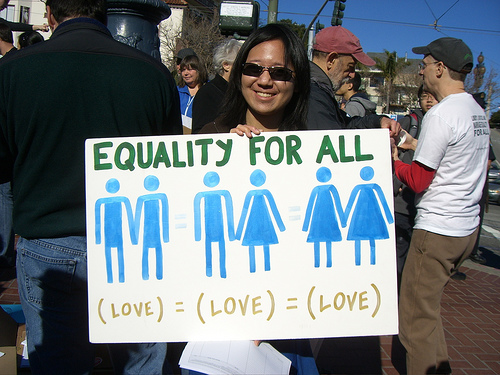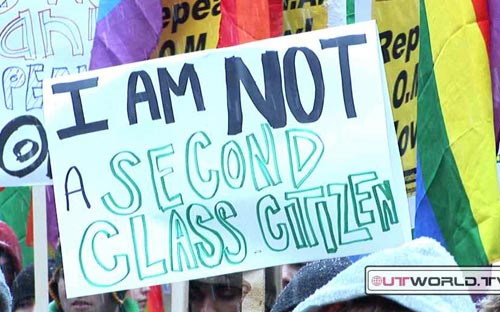For some time now, most of America has thought of Democrats as being “the party that likes gay people” and Republicans as “the party that doesn’t.” Although there are definitely some shades of gray there, this is not a baseless statement. Some new statistics, however, indicate that the political landscape around gay issues may be shifting radically – Democrats may be becoming the party that supports gay people, while Republicans belong to the party that has just decided to let it go.
National Journal has published a Political Insiders Poll on the issue of gay marriage – an insider’s poll being a survey of “political operatives, strategists, campaign consultants and lobbyists in both parties,” whose quotes are kept anonymous. Keep in mind that it doesn’t represent voters – but it does represent people who influence policy and campaign decisions for major politicians. And the numbers are pretty striking.
In 2009, only 59% of these Democrat insiders felt that their party should support gay marriage; in 2011, the same sentiment was expressed by a full 84% of them. Of course, it would be even nicer if that number was 100%, but as Pam’s House Blend points out, that number is in practical terms probably the most consensus you can ever expect to see around any given topic.
Some of the National Journal’s anonymous sources explained that “Many Democrats believe that gay marriage is not only “the right thing to do,” but that it is also no longer a wedge issue that cripples the party. “The country is moving quickly toward acceptance of gay marriage,” observed one Democratic Insider. “There is no need to hang back and expect civil unions to provide cover.” That’s great news, and will hopefully mean more action on the whole range of issues that are important to the gay community.
But perhaps even more important is the fact that while in 2009 50% of Republicans polled felt their party should oppose marriage equality instead of supporting or avoiding it, in 2011 56% percent of Republican insiders felt their party should just drop the issue of gay marriage altogether. Specifically, one said that “We haven’t come to a consensus on this issue but the country is changing so rapidly that it will a non issue in a few years. A confrontation now would just delay the inevitable.” This is, for all intents and purposes, a win. In Hollywood, this battle would end with the “bad guy” Republican party being forced to recognize all the harm their actions have caused and watch while it all crumbles around them in horror; in the real world, though, victory looks like this. It looks like the other side realizing that this fight just isn’t worth it anymore. Right now, several of the Republican presidential candidates actually have “preserving the traditional American family” as a main pont of their campaign platforms. But if these campaign strategists and lobbyists are correct about the political climate in their party (and if they aren’t, who is?) then that may become a thing of the past. The Republican party having an official policy of not engaging with gay marriage would mean, for instance, that future John Boehners wouldn’t try to hijack Congress’s time or money to defend an anti-gay marriage amendment that another branch of the same government has declared unconstitutional. Which would be pretty helpful in terms of the long-term plan of repealing things like anti-gay marriage amendments.
It also speaks to a kind of personal sense of victory – this means really hopeful things for our future legislatively, but also means that as activists and as people, we’re doing things right. It’s a slight overgeneralization, but we’ve made America into a place where opposing our families is effectively pointless. One GOP source was quoted as saying his party should support gay marriage because it’s a “[huge] issue with young voters we need… Only idiots fight demography.” As has been said before, the youngest generation of voters have views that are radically different from their predecessors; if voters under 30 were the only ones who went to the polls, same-sex marriage in America would be a done deal. That’s not exactly the same as saying that they reflect exactly what the voting landscape will look like in thirty years, but it’s close. And we did that, by making sure that our lives and our families are something no one can ignore; the “demography” in question here grew up in an America where gay families were an indisputable, if controversial fact, and now they’re forcing Republicans to acknowledge it as well.
Of course, these numbers only represent the issue of marriage equality specifically. It’s definitely the issue affecting gay Americans that gets the most exposure in the media and political sphere, but it’s not necessarily the most important issue to our day-to-day lives. What would be even better is if policy and thought leaders from both parties indicated that they’re interested in supporting health initiatives for queer communities, working on the problem of queer and trans homelessness, providing a comprehensive education including gay figures in history, or committing to ending the outrageously high rates of suicide attempts and mental health problems for queer and trans teens. Statements on those issues may be a longer time coming, but it’s not unreasonable to hope that Americans and their representatives will connect with the emotionally relatable issue of marriage and through it come to care about all the things that affect our families and our lives and keep us in the experience of being secondhand citizens.










Comments
California Gov. Jerry Brown is under enormous pressure from anti-gay hate groups nationwide about signing the LGBT history bill approved earlier this month by the state legislature. call his office directly: 916.445.2841.
i feel like things are changing really fast
I agree that things are changing really fast. It’s amazing to think that Stonewall was only 42 years ago and that homosexuality was considered a mental illness in America until 1973.
And yet things are not changing fast enough because our equality is long overdue.
This actually isn’t surprising. The entire country — including Republicans — are moving toward acceptance of gay marriage. There are enough high-profile Republicans I see on Fox News etc. who don’t want to argue this issue or say their party’s platform is wrong that I know Republicans will begin moving away from this issue altogether. They will oblige and be opposed, but you can tell they don’t give a fuck. The issue will still play in deeply conservative states for some time, but the northeast and any states with very large metros will not be voting against gay marriage fairly soon. We’re just not there yet. A number of states have fairly recently approved anti-gay referendums and others yet may still, but this just won’t work as a wedge issue in a few short years. For most Republicans, I don’t think “morality” issues like gay marriage is really what they care about anyway. Usually it’s a pro-business, small government philosophy. I don’t think gay marriage is even remotely crucial to the GOP’s identity and will be cut loose as soon as it stops proving useful.
It’s Democrat-IC, you idiot.
Whoa there, tiger.
The Creator, is that you?
I was thinking this, thank you for being the one to say it
Wow, interesting. Thanks, Rachel.
To me, the Republican insiders’ quick movement underscores how a lot of anti-gay politics is a product of what Republicans have found strategically useful. Not to deny the existence of anti-gay sentiment among the larger public (and some Republican insiders, no doubt), but still, Republican leaders had a CHOICE to make anti-gay stuff a central issue. Or not. They could have also not made it a central issue. And clearly they chose to do so, and now that it is no longer political expedient, they are dropping it, so clearly their former position was not a result of some strongly held moral position. Totally disgusting… reminds me of Governor Wallace, and lots of the racist politics that happened in the 50s and 60s (and still happens, I guess, but not quite as extremely/ obviously).
Rachel, I appreciate that your posts are always well-written, well-thought, and make these issues accessible and readily comprehensible. Thank you.
You guys are so great, for real
There’s a reason I’ve listed “Rachel’ political musings” as one of my favorite things about Autostraddle in my profile! <3
D-emocrat-ICK
just be careul – real carefull –
The repubs desperately want to control the senate and the presidency. then they get to decide who all the judges are, which is the last line of defense of equal rights and the constitution.
Second – virtually all of the westernized world has gay marriage or CUs, except italy where there already is lots of ferment ana a million people come to gay pride in rome. (check wikipedia)
Also except greece, home of hte other catholic church.
Amd mpw 6 copuntries in latin america and potentially chile as well, 3 and 3 with marriage / civil unions.
And 3 in E europe, Israel, RSA, Naepal, Au and NZ.
The right wing churches realize that America is almost the last of the western nations re granting gays equal rights, just as it was the last to end slavery. And the last of the nato nations to allow open service in the mil.
Of course all thanks to “christians”.
So my point is that once gays win in the USA, its all over all over the world except for the Islamic states.
I’d be real carefull re betting that the repubs would alianate their hateful base of right wing christians by ignoring this wedge issue.
they may well have some really nasty trick up heir sleeve re stopping gay equality.
And look at how in 2 years they all but changed the political landscape with the tea party nuts.
Dont underestimate these people. Remember the battle of the bulge – it came real close to splitting the allies offensive just when we thought the war was close to an end in Europe.
In many ways hitler was a genius – and not a dictator,how he got the german people to willingly follow him.
And the repubs seem quite capable of being a genius when hteir own power and control freaking is endangered.
Wait are you saying Australia has marriages/civil unions? Because… not exactly. (We’ve got defacto relationships, which include many of the rights of marriage, but no way to solemnize gay relationships, and I think that’s an important distinctions from civil unions/domestic partnerships seen elsewhere.
CLOSE PAREN
THESIS.
Team work! High five.
(I know paren. = parenthesis but I really wanted to team work y’know?)
My parents are def two of those Republican voters who have stopped opposing gay marriage. I think having a gay daughter changed their perspective (and also probably Glee ;) ) I am not 100% sure they support it fully, more that they just don’t care anymore.
This coming from the couple with the framed picture of them standing next to George W. Bush. Also my mom listens to Rush Limbaugh every night to go to sleep (which seems like the opposite of relaxing but to each their own..?)
Unfortunately apathy in regards to gay marriage probably won’t stop Repubs from voting for anti-gay candidates. I know my parents’ response when I bring up gay issues with them is essentially that fiscal stuff is more important than social stuff. Which is probably why my parents and I don’t agree on anything.. Because seriously, who says money is more important than freedom? Or love?
[…] them to get all the attention possible,” says House Leader D.J. Bettencourt. Despite more than half their own party wishing they’d stop talking about gay people already and their own beliefs about a small federal government, Republican presidential candidates […]